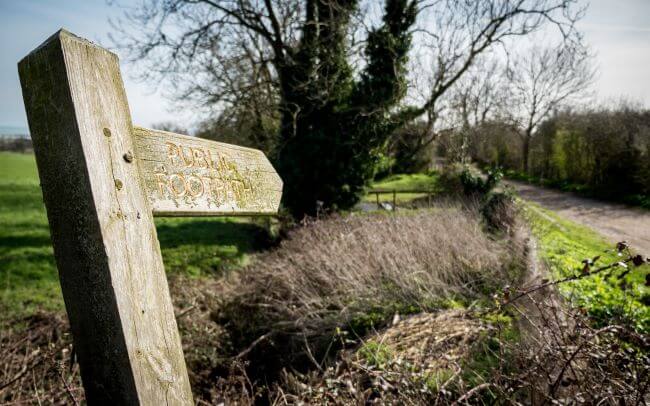Public access to private land a rising issue for farmers

Dealing with public access to rural land has always been a consideration for farmers and landowners in the UK – and the pandemic has seen a rise in the number of people wanting to enjoy a country walk or ramble.
This brings with it some complications over rights of way and what kind of insurance farmers may need to cover legal expenses when disputes arise.
Around 75% of the UK’s total land is considered agricultural land according to the most recent statistics, and that includes 140,000 miles of public rights of way in England and Wales.
These consist mainly of footpaths but also bridleways and other types of byways, which often crisscross farms and rural businesses of all sizes.
A rise in the number of people wanting to enjoy country walks is good for the nation’s health and emotional wellbeing, but for farmers it also means a greater risk of damage to land, crops and buildings if walkers do not keep to pathways or follow the Countryside Code.
There is also an increased risk to livestock when walkers unused to the countryside stray into areas where animals are grazing.
In insurance terms, there is also an issue of liability because farmers have a duty of care to those on their land.
Signposting private land
Education and signposting could be part of the solution.
A common myth held by walkers, for instance, is that of ‘the right to roam’, where people have a statutory right to access land and water for recreational and other purposes. But this only applies within parameters and doesn’t give them a right to roam wherever they want.
Under the Countryside and Rights of Way Act 2020, people can access land – known as open access land – which gives a public right of access.
Landowners should clearly signpost land which is private and cannot be accessed by members of the public.
Dealing with trespass
Unless there is a public right of way across a farmer’s land, anybody crossing it without permission is legally classed as trespassing.
This means farmers can ask the individuals to leave and use ‘reasonable force’ to remove them if they refuse. They may also be able to bring a civil case against those who trespass.
However, there are hidden dangers within this ruling.
What constitutes ‘reasonable force’ is debatable – and using any force comes with risk.
Landowners are not permitted to use weapons to remove a trespasser, and because trespassing is a civil offence it is not possible to ask police to remove them, either.
Most trespassers simply do not know the law or do not realise they have strayed onto private land. So, using communication channels to explain the legal routes and encouraging people to read the Countryside Code are the preferred solutions.
Dealing with claims that a right of way exists on your land
Where disputes frequently arise is whether a right of way exists and what the obligations the landowner has to maintain access to it.
To prevent or reduce the chances of a successful claim for the existence of a public right of way on their land, farmers are advised to seek legal advice in the first instance.
This advice should cover measures such as using legible and sufficiently sized signs and notices to identify and define land as private to stop people crossing it, or issuing a statutory declaration to confirm an existing right of way.
Legal expenses insurance cover
Legal advice is expensive, so taking out a commercial legal expenses insurance policy can provide cover not just for rights of way disputes, but also issues such as property, tax, employment disputes and regulatory compliance.
Furthermore, A-Plan Rural includes access to a free legal advice helpline with a legal expenses policy.
The key to making a successful claim is notifying insurers as soon as there are potential issues and before appointing anyone else. If you would like to use your solicitors, there is often the ability to do so provided it is agreed before proceedings begin.
Get in touch
To speak to a member of our specialist team call 01234 230295. Or email bedford.rural@aplan.co.uk.



